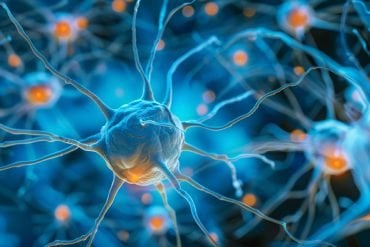Summary: Fetal placental macrophages can serve as indicators of fetal brain microglia health, which are crucial for brain development. Immune activation in pregnant women, such as from infections or obesity, can negatively affect fetal brain development.
The study used mouse models and found that male fetuses are more affected by maternal obesity than females. This research opens avenues for early identification and intervention in neurodevelopmental disorders.
Key Facts:
- Fetal placental macrophages can indicate the health of fetal brain microglia.
- Immune activation during pregnancy negatively affects fetal brain development.
- Male fetuses are more susceptible to maternal obesity’s effects than females.
Source: Mass General
Immune activation in a pregnant woman can have negative effects on the development of fetal brain microglia—or macrophage immune cells in the brain—and even lead to neurodevelopmental disorders in newborns.
It’s not possible to monitor how microglia are developing within the fetal brain, but new research indicates that the health of fetal macrophages in the placenta can act as an indicator of the health of fetal brain microglia.

The research was led by investigators from Massachusetts General Hospital, a founding member of the Mass General Brigham healthcare system, and is published in Cell Reports.
“If we can use fetal placental macrophages as a surrogate cell type or biomarker for fetal brain microglial programming, we have the opportunity to identify those children at greatest risk from in utero immune-activating exposures.
“Identifying these children early creates the potential to intervene during key developmental windows to ameliorate the impact of those pregnancy exposures,” said senior author Andrea Edlow, MD MSc, an associate professor of Obstetrics, Gynecology, and Reproductive Biology, and a Maternal-Fetal Medicine specialist at Massachusetts General Hospital. Dr. Edlow is also an MGH Research Scholar.
Examples of immune-activating exposures during pregnancy include bacterial and viral infections, metabolic inflammation from obesity and diabetes, environmental toxins and maternal stress. Edlow and her colleagues assessed placental macrophages in a mouse model of maternal diet-induced obesity.
Single-cell RNA sequencing of mouse fetal placental macrophages (or Hofbauer cells) revealed similar gene expression signatures as fetal brain microglia during normal conditions and also in response to maternal diet-induced obesity.
Interestingly, the sex of the fetus impacted how maternal obesity affects the placenta and the fetal brain. Specifically, male placental macrophages and fetal brain microglia had a greater number of genes dysregulated by maternal obesity and more neuroinflammatory signaling than female cells.
When the investigators compared their mouse data with published human datasets, they found conserved gene expression patterns in placental macrophages in mice and humans, suggesting that their findings in mice may have clinical implications in humans.
“This work is a promising start for using fetal placental macrophages as a biomarker for fetal brain microglial programming in a variety of maternal exposures, and it could form the basis for creating personalized fetal models of neurodevelopment using cells from the placenta that are easily accessible at birth,” said Edlow.
Funding: This research was supported by the Eunice Kennedy Shriver National Institute of Child Health & Human Development, the Robert and Donna Landreth Family Foundation, and the Charles Lafitte Foundation.
About this neurodevelopment research news
Author: McKenzie Ridings
Source: Mass General
Contact: McKenzie Ridings – Mass General
Image: The image is credited to Neuroscience News
Original Research: Open access.
“Hofbauer cells and fetal brain microglia share transcriptional profiles and responses to maternal diet-induced obesity” by Andrea Edlow et al. Cell Reports
Abstract
Hofbauer cells and fetal brain microglia share transcriptional profiles and responses to maternal diet-induced obesity
Highlights
- Microglia and fetal placental macrophages (Hofbauer cells) share a common yolk-sac origin
- scRNA-seq reveals shared transcriptional programs in these two cell types in maternal obesity
- There are sex differences in the impact of maternal obesity on Hofbauer cells and microglia
- Hofbauer cells may serve as biomarkers of the impact of maternal exposures on microglia
Summary
Maternal immune activation is associated with adverse offspring neurodevelopmental outcomes, many mediated by in utero microglial programming.
As microglia remain inaccessible throughout development, identification of noninvasive biomarkers reflecting fetal brain microglial programming could permit screening and intervention.
We used lineage tracing to demonstrate the shared ontogeny between fetal brain macrophages (microglia) and fetal placental macrophages (Hofbauer cells) in a mouse model of maternal diet-induced obesity, and single-cell RNA-seq to demonstrate shared transcriptional programs.
Comparison with human datasets demonstrated conservation of placental resident macrophage signatures between mice and humans.
Single-cell RNA-seq identified common alterations in fetal microglial and Hofbauer cell gene expression induced by maternal obesity, as well as sex differences in these alterations.
We propose that Hofbauer cells, which are easily accessible at birth, provide insights into fetal brain microglial programs and may facilitate the early identification of offspring vulnerable to neurodevelopmental disorders.






